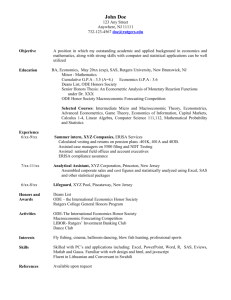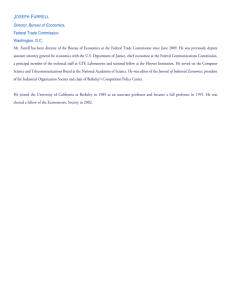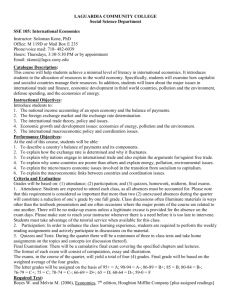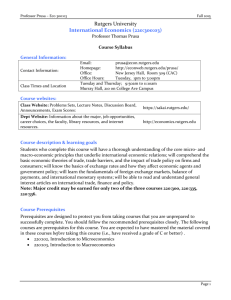Syllabus - Department of Agricultural, Food, and Resource Economics
advertisement
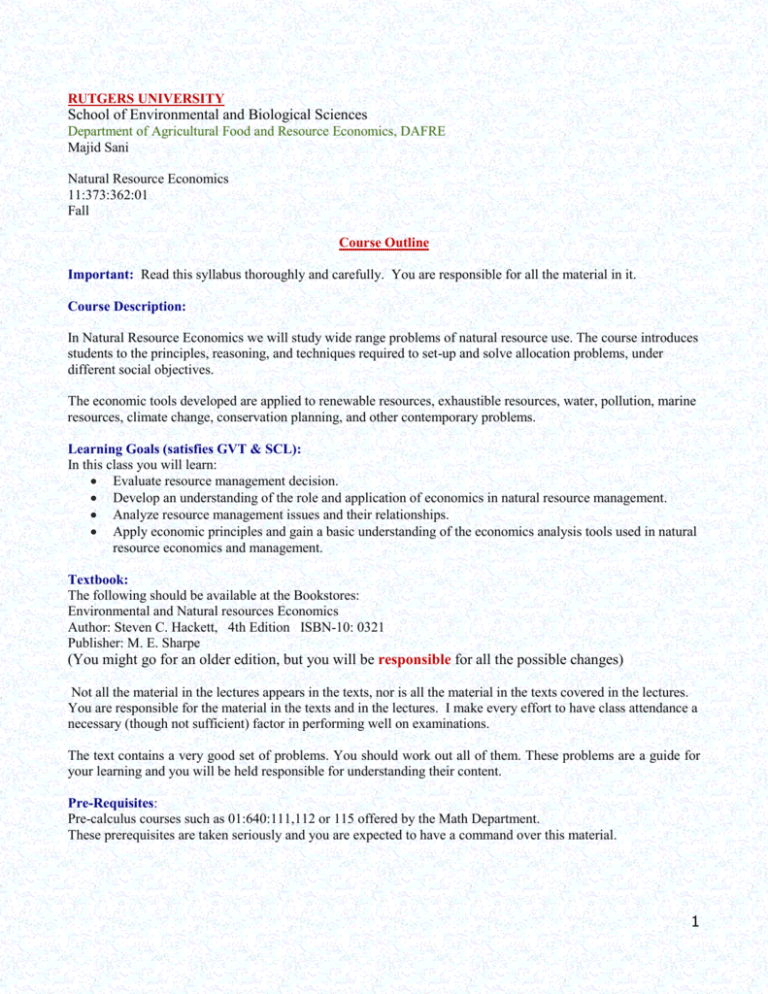
RUTGERS UNIVERSITY School of Environmental and Biological Sciences Department of Agricultural Food and Resource Economics, DAFRE Majid Sani Natural Resource Economics 11:373:362:01 Fall Course Outline Important: Read this syllabus thoroughly and carefully. You are responsible for all the material in it. Course Description: In Natural Resource Economics we will study wide range problems of natural resource use. The course introduces students to the principles, reasoning, and techniques required to set-up and solve allocation problems, under different social objectives. The economic tools developed are applied to renewable resources, exhaustible resources, water, pollution, marine resources, climate change, conservation planning, and other contemporary problems. Learning Goals (satisfies GVT & SCL): In this class you will learn: • Evaluate resource management decision. • Develop an understanding of the role and application of economics in natural resource management. • Analyze resource management issues and their relationships. • Apply economic principles and gain a basic understanding of the economics analysis tools used in natural resource economics and management. Textbook: The following should be available at the Bookstores: Environmental and Natural resources Economics Author: Steven C. Hackett, 4th Edition ISBN-10: 0321 Publisher: M. E. Sharpe (You might go for an older edition, but you will be responsible for all the possible changes) Not all the material in the lectures appears in the texts, nor is all the material in the texts covered in the lectures. You are responsible for the material in the texts and in the lectures. I make every effort to have class attendance a necessary (though not sufficient) factor in performing well on examinations. The text contains a very good set of problems. You should work out all of them. These problems are a guide for your learning and you will be held responsible for understanding their content. Pre-Requisites: Pre-calculus courses such as 01:640:111,112 or 115 offered by the Math Department. These prerequisites are taken seriously and you are expected to have a command over this material. 1 Lecture Topics: The following is a list of lecture topics. On some I will go into great detail, others I will but mention in passing. 1. Introduction 2. Value 3. Markets 4. Externalities First Exam: 5. The Economics of Natural Resource Systems PART 1 6. The Economics of Natural Resource Systems PART 2 7. An Introduction to Benefit Cost Analysis 8. Political Economy Second Exam: Term Paper Research Subjects: 1. Sustainable Economic Development 2. Issues in Sustainable Production and Consumption Final Exam: Term Paper Presentation Exams are not cumulative but they very much related. Grades will be posted on Sakai Gradebook: “https://sakai.rutgers.edu/portal” a week after the test. For the course information, announcements, and practice test questions please visit Sakai. Evaluation of Students: There are three exams: Two Midterms and one final. Exams will consist of multiple choice questions. Grading will be based on the university standard grading system. Grades will be based on three examinations according to the following distribution: First Exam 40% Second Exam 40% Term Paper and Presentation 20% There will be no opportunity to makeup an exam. If you miss an exam, you will receive a grade zero for that exam. However, if circumstances warrant, an alternative may be made possible by bringing a valid document. There are no extra-credit assignments. Plan to do well on the required material. Grades will not be given by the e-mail. No exceptions. Student Disability: Reasonable accommodations will be provided for students with documented disabilities. Students who have registered with The Office of Disability Services should make this known to the instructor. Students who have not yet registered their documented disability should do so immediately. Problems to work on: The text contains a very good set of problems. You should work out all of them. These problems are a guide for your learning and you will be held responsible for understanding their content. The problems I consider most important are contained in the attachment list. This does not mean that you should not work through the other problems, only that I think these will be of the greatest value at the margin. I strongly suggest that you do all the 2 problems in the Study Guide in the relevant chapters. I also strongly suggest that you do not look at the answers until you have spent several days working out a problem. If you "cheat" the exercise will prove of no value to you. Attendance and Participation: Regular class attendance is expected and class participation will be encouraged. Students will be responsible for all work missed during an absence, no matter what the reason for the absence. Consistent class attendance and worthwhile class participation will be viewed favorably in assigning grades for "borderline" cases. Examination Rules: Only pencils, pens, erasers, pencil sharpeners, a calculator (you must have and use your own calculator), and a watch are allowed. You are best off not bringing anything else to the exam. If you do, put it in a bag under your seat. A note about the calculator: You are allowed to use just a regular calculator. You are NOT allowed to use smartphones or smartwatches or any electronic/digital device with wireless and storage capability as a calculator. Using such these devices during the examinations considered as a cheating. For academic integrity policy: I would like to remind everyone that violations of the university code of academic integrity, including plagiarism and cheating, will not be tolerated by the department or the university. Such violations are harmful to everyone and only serve to poison the atmosphere of openness and mutual trust on which an academic department depends. If there any questions regarding the integrity code, please refer to the graduate school pamphlet dealing specifically with these matters. For more details please visit the following: The policy statement on student conduct: http://catalogs.rutgers.edu/generated/nb-ug_current/pg21725.html http://catalogs.rutgers.edu/generated/nb-ug_current/pg21724.html Office Hours: Monday 10:45-1:45 PM Thursday 10:30-12:00 PM (by appointment) Cook Office Building. Room 116 55 Dudley Road, New Brunswick, NJ 08901-8520 You can reach me either by e-mail: sani@econ.rutgers.edu (preferably) or by telephone: (848)932-9138 (Weekend e-mails will be answered on Monday, except the weekend before the exams.) Note: Note that I reserve the right to alter the contents of this syllabus during the semester. P.S. Should I be forced to miss a class, I will make every effort to provide prior notice. In the absence of such notice, please wait 20 minutes past the hour. 3 No makeup examNo grade by email Homework assignments: TBA 4



